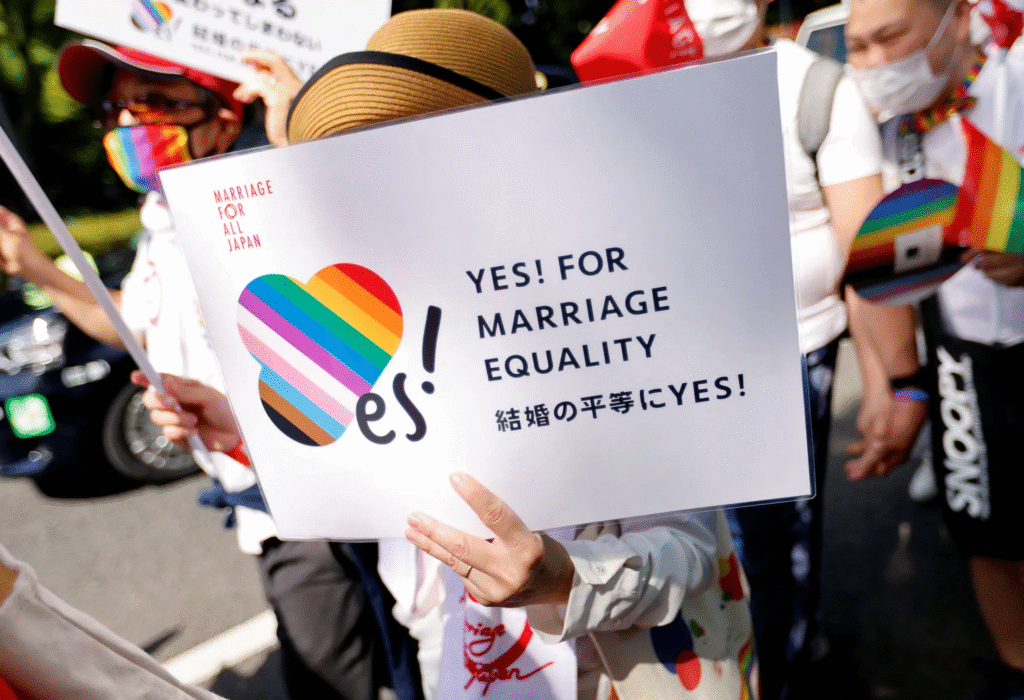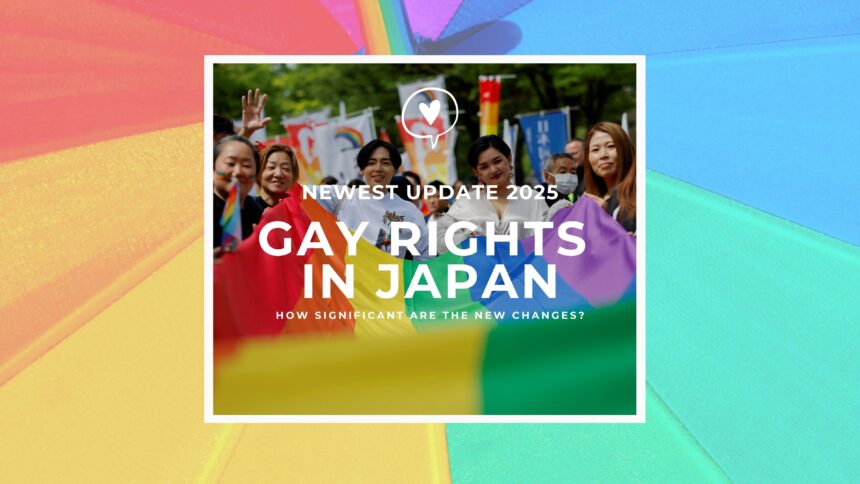In conservative Japan (which has just elected a new conservative Prime Minister) change can be slow and difficult, and so it is with the expansion of LGBTQ+ rights. However, every now and again, there are sudden steps forward in gay rights in Japan.
For example, on September 30, 2025, the government announced that LGBTQ+ people would be included in a further nine laws that applied to people considered to be in a common law marriage. What does this mean, and what was the reaction of the LGBTQ+ community?
Background

Back in March of 2024, the Supreme Court threw out the verdict of the Nagoya High Court that deemed Yasuhide Uchiyama ineligible for compensation under the Crime Victims’ Benefits Act, which stipulates that partners of those who are murdered are eligible for reconstitution. Uchiyama’s partner, also a man, lost his life to a murderer, and four of the five judges found that to deny his request based on the gender of his partner was “clearly not in line with the law.”
Following this decision, the government expanded the protection of 24 laws that applied to those in common law marriages, including the Building Leases Law and the Spousal Violence Prevention Law, to include LGBTQ+ people in January of this year. Then, just a few weeks ago, it was announced that a further nine laws would be expanded to include LGBTQ+ couples in the definition of “common law marriage” for the purposes of eligibility. So what are they?
New Provisions

On September 30, the government announced that it would bring the total number of laws that protected LGBTQ+ couples, and would treat them in the same fashion as heterosexual couples in common law marriages. These new additions include eligibility for the “Act on the Provision of Disaster Condolence Payments,” meaning that the LGBTQ+ partners of those who lose their lives as a result of earthquakes, floods, and other such acts of nature can be compensated.
However, in the same statement, the government made it clear that it was making the choice not to extend the eligibility of LGBTQ+ people to 120 other laws that straight couples in common law marriages enjoy.
What is Not Included?

Among the laws that LGBTQ+ people are not provided for currently, that heterosexual couples in common law marriages are the Child Support Allowance Law, Law Concerning Working Hours, Leave, etc. of Regular Employees, the Pension Act, and the Enforcement Order of the Inheritance Tax Act.
As such, while this can certainly be considered a positive development, there are still many areas where LGBTQ+ do not have protections that are enjoyed by their straight equivalents.
Reactions from the LGBTQ+ Community

Owing to the expansion of rights, but the seemingly arbitrary denial of access to 120 other laws, several LGBTQ+ organizations had a mixed response to the news. For example, Makiko Terahara and Akiyoshi Miwa, the representative directors of Marriage for All Japan, praised the positive, while highlighting the problems.
“The addition of new laws and regulations that may be applicable is commendable to a certain extent,” they said. “Unfortunately, however, the rest of the report is largely unacceptable. [T]he government did not include same-sex couples in “common-law marriages” under basic social security systems such as employment insurance, social insurance, and pensions. As a result, for example, it is expected that survivor’s pensions, which are paid to surviving partners in common-law couples, will not be paid to same-sex partners across the board.
“Given that the government has not included same-sex couples in the “common-law marriage” category in the social security system, while adding laws and regulations that treat them as disadvantaged as common-law couples, we have no choice but to say that the government is making arbitrary decisions about how to apply laws to same-sex couples.”
Yuichi Kamiya, the representative director of The Japan Alliance for LGBT Legislation (J-ALL) delivered similar sentiments at a press conference on October 1.
“The fact that same-sex marriage is recognized in 33 laws (including the Domestic Violence Prevention Act) is encouraging for those involved,” he said. “However, it is problematic that they are excluded from important laws that are closely related to their daily lives. It is unacceptable that they are excluded from social security laws (such as pensions and insurance). I hope that further consideration will be given.”
As ever, the struggle for gay rights in Japan continues forward, albeit slowly. As always, the intractable problem of a society that has equality for all written into several articles of its constitution, only to refuse to grant them to a minority for arbitrary reasons — as was found to be the case by five Japanese High Courts — cannot last. As Miwa and Terahara said at the conclusion of their statement:
“We once again call on the government to revise the Civil Code to include same-sex couples in the current marriage system, and to grant them the same rights and obligations as opposite-sex couples.”






